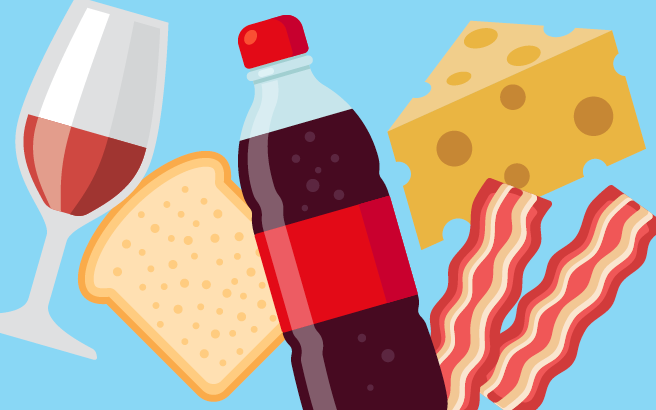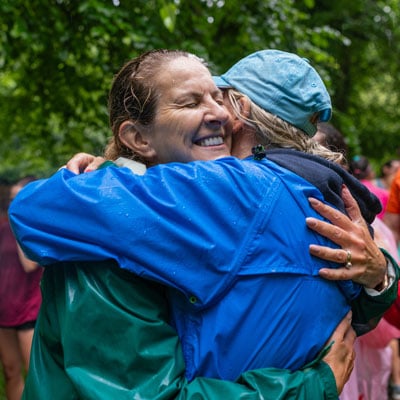Myth 1: Only old people get cancer
Key stat: Nearly two-thirds of cancer diagnoses occur in the over-65s and one-third in people aged 75 or over (Source: PHE/NHS)
 Prof Martin Wiseman, says:
Prof Martin Wiseman, says:
Cancer is mainly a disease of older people, although it’s important to recognise that younger people and children can also be affected by this devastating disease.
However, the fact that most people are diagnosed in their 60s means that our lifestyle choices before then are really important. What we eat now, and how active we are, really does affect our chances of developing cancer in later life.
Myth 2: Red wine is good for you
Key stat: Alcohol increases the risk of developing at least six different types of cancer (Source: Diet and Cancer Report)
 Prof Wiseman says:
Prof Wiseman says:
For many years, people have rather hopefully talked about the benefits of red wine, in particular the fact that red wine contains substances called “antioxidants” which have been suggested to protect our hearts.
However, while very small amounts of alcohol (about 1 drink a week) are linked to slight heart protection, any benefits are wiped out by drinking more than that. Furthermore, studies have failed to show any benefit on heart health from “antioxidants”, and red wine does not seem to differ from other sources of alcohol.
What has been under-reported for years is that alcohol (whether from red wine or any other drink) can increase our risk of mouth, oesophageal, breast, bowel, stomach and liver cancers, so our advice is not to drink alcohol.
Myth 3: Just one rasher of bacon can give you cancer
Key stat: Up to 67% of bowel cancer cases in the UK are preventable (Source: Goon S, Kim H and Giovannucci EL)
 Our expert, Prof Wiseman, says:
Our expert, Prof Wiseman, says:
When someone is diagnosed with cancer, they often ask “Why me?”. People understandably want to know what caused their cancer, but unfortunately doctors can’t yet tell what causes individual cancer cases. One of anything – whether it’s a rasher of bacon, a cigarette, a pint or a sunbed – can’t give you cancer.
Instead, our likelihood of developing cancer depends on a whole range of lifestyle choices, including the food we eat, over several years.
What we do know – through many, many population studies – is that more than half of bowel cancer cases could be prevented. And one of the ways to help prevent bowel cancer is to limit how much red meat you eat, and avoid processed meat altogether.
Myth 4: Dairy is bad for you
Key stat: The UK drank 6,676,000,000 litres of milk in 2018 (Source: Defra)
 Our expert, Prof Wiseman, says:
Our expert, Prof Wiseman, says:
Media reports linking dairy products and cancer are common, following claims based on bad science. We’re a tea and cheese-loving country, after all! Often the culprit is claimed to be the hormones given to cows to make them grow and produce more milk, but those hormones are destroyed in the stomach after being eaten.
The evidence is quite complicated. We actually have strong evidence that dairy products probably protect against bowel cancer, and limited evidence suggesting that these products might protect against breast cancer.
However, we do also have limited evidence that dairy products might increase the risk of prostate cancer. More research in this area is needed to help us work out what’s going on in the body when we consume dairy products.
Myth 5: Sweeteners in fizzy drinks cause cancer
Key stat: A 500ml bottle of cola contains the equivalent of 17 cubes of sugar (Source: NHS)
 Our expert, Prof Wiseman, says
Our expert, Prof Wiseman, says
Studies on artificial sweeteners, including saccharin and aspartame, have shown no convincing evidence of a link with cancer. The real danger of soft drinks is the amount of sugar they contain.
There is convincing evidence that sugary drinks are a cause of excess weight gain in children and adults, because these drinks can result in us taking in more calories than we burn off. The best advice is to drink mainly water or unsweetened drinks.
Myth 6: Burnt toast causes cancer
Key stat: Acrylamide is a chemical that forms when starchy food is cooked to above 120°C (Source: Food Standards Agency)
 Our expert, Prof Wiseman, says:
Our expert, Prof Wiseman, says:
Some animal studies have shown a link between acrylamide and cancer. However, we funded research on a large study of people across Europe and didn’t find any strong evidence for a link.
More research is needed, but while the debate continues as to whether we should be concerned about acrylamide, we know that there are things that DO reduce your cancer risk, such as not smoking, staying a healthy weight, avoiding alcohol and getting active.
> Clingfilm, coffee and underwired bras: we explore other cancer myths
Prof Martin Wiseman is World Cancer Research Fund’s Medical and Scientific Adviser. Martin is Visiting Professor in Human Nutrition at Southampton University and former Head of Nutrition at the Department of Health in England. He is one of the country’s leading experts on the links between food, nutrition, body weight, physical activity and cancer.



